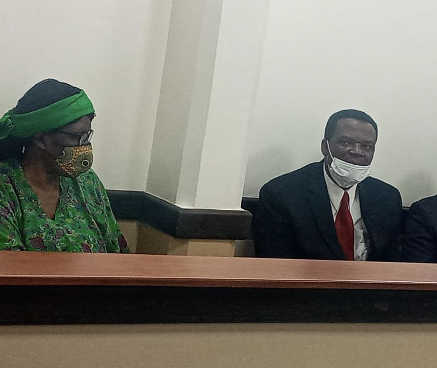It’s a win for Sirisia MP John Waluke after the court of appeal overturned his conviction and 67-year jail term in the Sh313 million maize case.
Also off the hook is his business partner Grace Wakhungu who had been sentenced to 69 years in prison.
“We are satisfied that the appellants have made a case to warrant us to allow their appeal. Their conviction and sentence are set aside. The appellants shall immediately be set free unless otherwise lawfully held,” said the court of appeal Judges
Waluke and his business partner Grace Wakhungu were 2020 convicted and sentenced by Magistrate Elizabeth Juma after they were found guilty of various charges ranging from uttering false documents and unlawful acquisition of public property.
Wakhungu got a 69-year jail term while Waluke was handed a 67-year jail term.
Both were given an option of a Sh1 billion fine.
They were directors of Erad Suppliers.
It was alleged that they fraudulently acquired Sh313 million from public coffers purporting it to be costs of storage of 40,000 metric tonnes of white maize purportedly incurred by Chelsea Freights.
They were aggrieved by their conviction and sentencing and subsequently filed an appeal at the High Court.
But Judge Esther Maina said the sentences were not excessive but within the law.
She also said the invoice upon which the claim for payment was based was a forgery.
“Waluke presented it to the arbitrator knowing Erad Supplies Limited had no deal with the maker of the invoice -Chelsea Freight Limited- and as a result, it was paid huge sums of money by a public body,” she said.
Aggrieved, the duo appealed to the court of appeal where Justice Asike Makhandia and Patrick Kiage overturned the decision.
The appellate judges faulted the lower court for failing to re-analyze and re-evaluate the evidence tendered in the trial court as required by the law.
They said the High Court being the first appeal court had a duty to analyze and re-evaluate afresh all the evidence produced before the trial court and reach its own independent conclusion.
“A proper re-evaluation of the evidence would have revealed that there was no evidence that Waluke received money in all the charges relating to the acquisition of public property since the money had only been deposited with the advocates of the company,” they said.
The appellate judges said if the trial court had reevaluated the evidence as required, it would have noted that the amounts in the charge sheet were specific and required separate proof.
Waluke had been accused of making a false invoice worth Sh114,600,000 as evidence to support a maize storage claim by Chelsea Freights.
He was also charged with fraudulently acquiring Sh297 million from the public as the cost of storing the maize, which was to be supplied to NCPB.
But Makhandia and Kiage said that even if the offence of uttering false documents had been proved, it did not automatically mean that the other offences Waluke had been charged with had been committed.
Both Waluke and Wakhungu in their appeal have claimed that the Sh313 million that formed a basis for their conviction was lawfully paid out to them.
Court records indicate that the company Erad Supplies won a contract to supply the government with maize sometime in 2004.
However the company, according to their lawyers, could not supply the maize after NCPB failed to issue a letter of credit thus breaching the contract.
Following the said breach, Erad sued NCPB, and the dispute was resolved before an arbitrator.
The company was then awarded damages for breach of contract.
The same was confirmed by the High Court.
It is on that ground that Wakhungu in her appeal said such payments cannot form the basis of a criminal charge of obtaining money fraudulently.
The court of appeal in addition faulted the NCPB for turning to the EACC to have the duo charged after they were unable to secure overturn the award granted to Read directors.
“This appears to us as the worst form of abuse of the criminal process. It was obviously undertaken for ulterior motives, not for genuine vindication of any rights,”


















